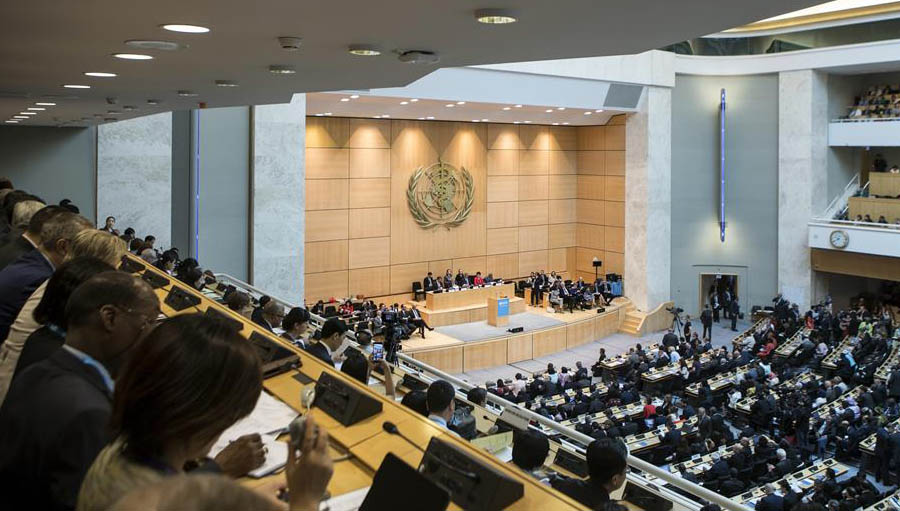Join a powerful, unprecedented alliance for better eye health for all.
Join IAPB-
Choose an alternate language here

The 71st World Health Assembly (#WHA71), the annual decision-making body of the WHO, took place in Geneva on 21st-26thMay. Johannes Trimmel, Peter Holland and I attended, participated in numerous events, and met key WHO officials and other players. The mood was positive and optimistic: WHO Director General Dr Tedros and the new team were successful in getting agreement to their strategy, the General Programme of Work 2019-2023 (#GPW13). If resources follow and all goes to plan, it will lead to a significant shift in the way the WHO operates. Everything will be geared towards achieving universal health coverage and the realisation of the health SDGs. The WHO aims to become more impact-focused, more country needs and in-country action oriented, and take a stronger leadership role. Although many countries in the debate called for a clearer way forward and a more detailed impact framework and indicators, there was strong support for the strategy and for its strengthened in-country focus.
The sub-title of the General Programme of Work is ‘Promote health, Keep the world safe, Serve the vulnerable’. It has 3 targets:
Partly in response to mistakes in tackling Ebola and the evident weak underlying health systems, the programme includes continued and increasing emphasis on health systems as well as changes in the way the WHO shall address emergencies. The emphasis on Universal Health Coverage and the focus on health systems and integrated and people-centred care offer significant advocacy opportunities for eye health. There is also very welcome attention to disability inclusion, including some focus on rehabilitation, and numerous references to equity and rights.
According to the WHO team we met with during the week, WHO’s work on eye health will demonstrate alignment to the General Programme of Work. They are doing some work on their future work programme, including looking at what technical products should be developed to support the integration of eye health in health systems and take advantage of the stepped-up push for Universal Health Coverage globally. The aim being to ensure that all people can access eye health according to need and without suffering financial hardship. On the topic the WHO team is looking at, is developing a priority package for eye care interventions. This potential to develop this package was highlighted in the consultation draft of the World report on vision from earlier this year. They are also looking at options to keep eye health on the global health agenda and to monitor progress.
The adoption of the Assistive Technology resolution was a big win. Despite massive unmet need, assistive devices have not been on the WHA agenda before. During the week, IAPB met with the WHO’s Global Cooperation on Assistive Technology team (GATE), WHO’s global partnership initiative on assistive technology, with whom we already have a close relationship. IAPB’s Standard List now incorporates GATE’s vision related assistive devices. The resolution gives GATE a clear mandate for its work. It will be an important tool to promote better systems and access to assistive devices, as countries have made a commitment to strengthen their policies and programmes on access to assistive technology. The resolution should also benefit access to vision related devices as they are heavily featured in WHO’s work on assistive devices. The GATE team has a number of actions underway, including developing guidance for procurement, work on standards and a training package for primary healthcare, which includes a module on vision and reading glasses.
Other important developments around the WHA included:
This is an exciting time for eye health. Ahead of the launch of the World Report on Vision IAPB and members are starting to work on a resolution for the following World Health Assembly. We aim to secure support and buy-in from countries on recommendations and next steps on eye health as set out in the World Report on Vision. The WHO eye health team are keen to work with IAPB and members on the future work programme, including the development of the priority package of eye care interventions. We will have an important role in ensuring that the package is comprehensive and fit-for-purpose, and in advocating with governments to ensure they include comprehensive eye care in their UHC schemes. WHO may also seek help in piloting integration approaches.
There is a lot to do. As implementation of the General Programme of Work begins, we will need to support WHO in their efforts to help make eye health integral to Universal Health Coverage and ensure governments take the practical steps needed to make eye health for all a reality.
For more information on Universal Health Coverage and the GPW13 or on disability inclusion and the GPW13, please email [email protected].
(An earlier version of this post noted that the World Report on Vision would be launched in October, and that it would be followed by a resolution in WHA 2019. This has now changed. This post also listed Johannes Trimmel’s IAPB email ID for any queries on UHC and GPW13. Johannes no longer works for IAPB.)